Tea is something I drink every single day. It’s sacred at my house – I even have a whole drawer devoted to it! I drink it because it is amazing for your health. There are so many varieties of tea that can improve digestion, metabolism and even prevent certain diseases. This investigation into tea ingredients has been in the making for a long time. What I’m about to share with you totally rocked my world forever and I’ll never look at tea in the same way again. Do you really want to know what’s in your tea?…Then read on.
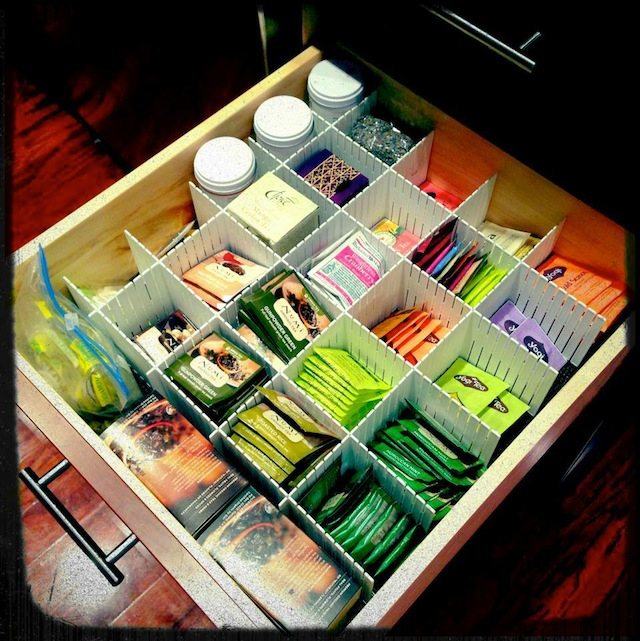 The ancient Chinese tradition of drinking tea dates back thousand of years to the early Chinese dynasties and aristocrats who drank the beverage for its medicinal properties. In ancient times, leaves from the Camellia Sinensis (the tea plant) were either ground into a powder or placed as loose leaves directly into water to infuse it with herbal essence. Unfortunately, modern day tea is nothing like the unadulterated version of old tea. Many of today’s tea brands are operating under the guise of providing health benefits and promoting clean living, but are actually laden with pesticides, toxins, artificial ingredients, added flavors and GMOs.
The ancient Chinese tradition of drinking tea dates back thousand of years to the early Chinese dynasties and aristocrats who drank the beverage for its medicinal properties. In ancient times, leaves from the Camellia Sinensis (the tea plant) were either ground into a powder or placed as loose leaves directly into water to infuse it with herbal essence. Unfortunately, modern day tea is nothing like the unadulterated version of old tea. Many of today’s tea brands are operating under the guise of providing health benefits and promoting clean living, but are actually laden with pesticides, toxins, artificial ingredients, added flavors and GMOs.
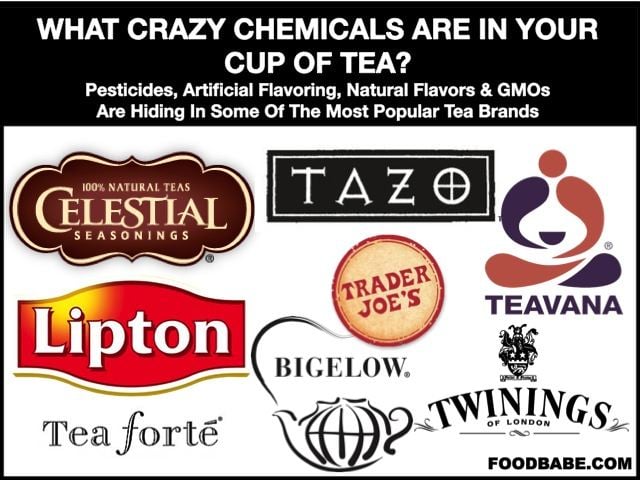
Conventional Teas – An Abundance of Pesticides
Did you know that most tea is not washed before it is put it into bags? That means if the tea was sprayed with cancer-causing pesticides, those pesticides go directly into your cup. And this is the reason why tea is on my organic shopping priority list. To prove this point, here are some shocking facts about one of the most well-known tea brands – Celestial Seasonings.
A recent third-party analysis by Glaucus Research and discussed here found that 91 percent of Celestial Seasonings tea tested had pesticide residues exceeding the U.S. limits. For example, Sleepytime Kids Goodnight Grape Herbal contained 0.26 ppm of propachlor, which is a known carcinogen under California’s Propsition 65.
The “Wellness” tea line was found to contain traces of propargite, also a known carcinogen and developmental toxin. The FDA has already issued two warning letters to Celestial Seasonings in regard to poor quality control according to this source. Imagine what happens when pesticide-laden tea is steeped in boiling water.
If grocery store brands don’t provide a clean option for you, perhaps a high-end loose leaf tea would circumvent some of the issues of grocery store brands. Right? Wrong! Take Teavana, which is found in malls across North America for example. Teavana taps into tea culture with the “Teavana Experience.” Convincing their employees to take customers on a sensory journey – they open a huge canister of loose leaf tea and wave the top of the canister so you can smell the tea – touting all of the wonderful health benefits of tea complete with samples and manipulative demonstrations that end in an expensive visit to the tea shop. Is all the extra money worth it? Are customers getting a superior tea product? No.
Teavana tea was tested by an independent lab and 100 percent of it was found to contain pesticides. One tea in particular, Monkey Picked Oolong, contained 23 pesticides. 77 percent of the teas would fail European Union pesticide import standards, and would be banned from import. 62 percent of the teas tested contained traces of endosulfan, a pesticide that has been banned by the U.S., China, the E.U., and 144 other countries because it has been linked to impaired fertility and could harm unborn babies.
UPDATE (May 27, 2014): Glaucus Research funded the research done by Eurofins Scientific (an independent lab) and admits on their disclaimer that they are biased because they would make money if Hain’s stock declines. However – I am not sure that Eurofins’ research should be completely discounted on this point alone. Since I wrote this post, Celestial has been sued in a class-action lawsuit based on the pesticides that Eurofins found in their teas and for mislabeling of them as “100% Natural”. The jury is still out on whether Eurofins’ research will be considered legit, as this case is still active in California. The Plaintiffs contend that Celestial’s teas contain “pesticides, herbicides, insecticides, carcinogens, and/or developmental toxins (collectively, “Contaminants”)” and Celestial “did not dispute – and has never disputed – that the tea Products contained Contaminants. Nor has (Celestial) challenged the results of the Eurofins Tests” and “has not claimed that Eurofins was biased or that the Eurofins Tests were not, in fact, accurate”. Even if it is determined that Eurofins’ research was not accurate – it’s important to note that Celestial’s tea that was tested is NOT organic and some of this tea is sourced from China. Greenpeace issued a report on the alarming amount of pesticides found on tea from China, followed up by a detailed report on Lipton brand tea from China – in which they recommend only purchasing certified organic tea to avoid these pesticides. Reference law documents: Complaint; Plaintiff’s Memo in Opposition to Motion to Dismiss. Case 8:13-cv-01757-AG-AN
Teas Can Contain Artificial Flavoring, Natural Flavors, and Hidden GMOs
Furthermore, a majority of Teavana teas contain added flavor – specifically “artificial flavoring.” If their tea is so high end, why would they be adding ingredients produced by fractional distillation and chemical manipulation of various chemicals like crude oil or coal tar? Coal tar in my tea? No, thanks.
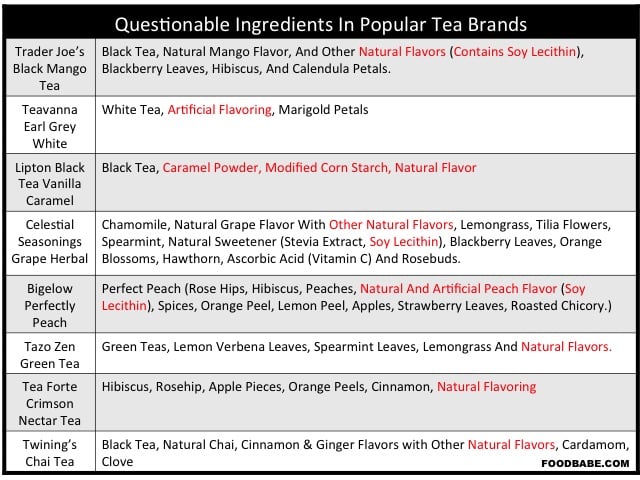
Many popular tea brands get away with using the ingredient “natural flavors” to trick the consumer into thinking they are buying better, cleaner ingredients; however companies are just covering up the inferior taste and low quality of their tea. Fortunately, there are brands that are putting the kibash on the use of natural flavors and using all real ingredients. I was happy to learn that Ahmed Rahim, CEO of Numi Tea is just as disgusted by this ingredient as I am. He said to me “You can breakdown anything that is found in nature and if it ends up tasting like the flavor you wish to use – you can add it to any product and call it NATURAL FLAVOR on the ingredient label. It could come from a stone in the ground and you’d never know.” This is why when I see the words “natural flavor” listed on a label – I put the product down and run far far away. I want to know what I am eating! Don’t you?
Additionally, the added risk of consuming possible GMOs is not something many people think about when consuming teas. Before this investigation and witnessing tea companies using modified corn starch and soy lecithin in tea (additives likely made from genetically engineered corn and soy), I didn’t think about it either! I can’t imagine having a serious soy allergy, considering all the places companies try to hide it.
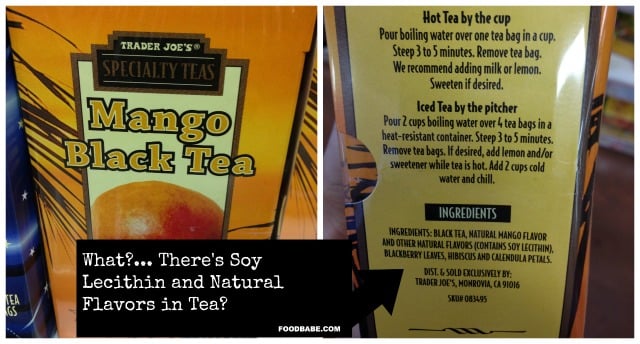
Why The Tea Bag & Packaging Matters
A recent article in The Atlantic discusses the “silky sachet” and “luxurious mesh bags” that hold loose leaf teas (like in brands Tea Forte and Mighty Leaf). Turns out, these modern day bags meant to showcase the tea leaves, are made of plastic.
PLA (polylactic acid) is a (likely GMO) corn-based tea bag material that has attracted major tea companies due to its nice look and its claims of biodegradability. Terms like “silky sachets” and “corn-based biodegradable tea bags” mislead customers into believing a product is more natural and sustainable than it really is. While the processing for PLA removes all traces of genetic material, it is still made with genetically modified corn. Although the actual tea bag is not an ingredient like teas and herbs, it is an element that is put into boiling water.
According to The Atlantic, tea bags are most commonly made from food grade nylon or polyethylene terephthalate (PET) which are two of what’s considered the safest plastics on the scale of harmful leaching potential. However, Dr. Mercola disagrees, he states:
“While these plastics are generally considered among the safest in terms of leaching potential, the molecules in these plastic tea bags may still in fact break down and leach out when steeped in boiling water…” Well, isn’t that how tea is prepared?
Another temperature consumers need to worry about in tea is the “glass transition” temperature. Here’s the science behind the glass transition temperature or, Tg, and why it becomes dangerous according to The Atlantic:
“That is the temperature at which the molecule in certain materials such as polymers begin to break down. As a rule, the Tg of a material is always lower than the melting point. In the case of PET and food grade nylon (either nylon 6 or nylon 6-6), all have a Tg lower than the temperature of boiling water. For example, while the melting point of PET is 482 degrees Fahrenheit, the Tg is about 169 degrees. Both nylons have a lower glass transition temperature than PET. (Remember that water boils at 212 degrees.) This means the molecules that make up these plastic tea bags begin to break down in hot water.”
So, while the plastic itself won’t melt in your tea, the glass transition temperature could potentially leak out harmful phthalates if there are such things in your tea. Another thing to worry about is that some of the newer tea bags are made with a variety of plastics. Some plastics are nylon, some are made of viscose rayon, and others are made of thermoplastic, PVC or polypropylene.
Beware of paper tea bags too, which can be worse than plastic tea bags.
GET THIS: Also according to Dr. Mercola, many “paper tea bags are treated with epichlorohydrin, a compound mainly used in the production of epoxy resins. Considered a potential carcinogen by the National Institute for Occupational Safety and Health2 (NIOSH), epichlorohydrin is also used as a pesticide. When epichlorohydrin comes in contact with water, it hydrolyzes to 3-MCPD, which has been shown to cause cancer in animals. It has also been implicated in infertility (it has a spermatoxic effect in male rats) and suppressed immune function.”
So what do you do the next time you want a cup of tea? Antioxidant rich teas aren’t going to do much to counterbalance the chemicals, additives and artificial flavorings in today’s modern teas.
First, I recommend looking at this chart below to see how your favorite tea brand stacks up:
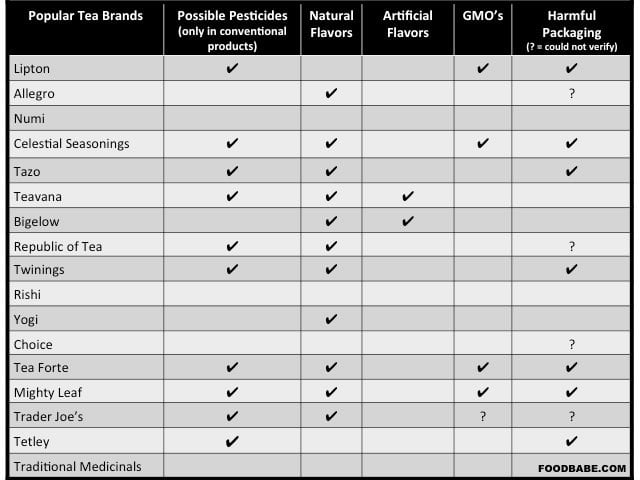
And then when brewing and picking out the safest tea remember these tips:
1. Choose an organic & non-GMO certified brand of tea. (My favorites are Numi, Traditional Medicinals, and Rishi Tea (loose leaf)).
2. Check the ingredient list on the back of the tea package to make sure there are no added flavors, GMO ingredients like soy lecithin and corn starch added to the tea leaves.
3. Make sure the brand you buy uses a safe form of packaging material or buy loose leaf tea and use a stainless steel or glass tea strainer. Have the company verify that bags do not contain epichlorophydrin, and avoid plastic tea bags all together. (Numi and Traditional Medicinals are some of the only brands I trust in this category because they have publicly stated they do not use this harmful ingredient or GMO packaging and are Non-GMO Project verified.)
4. The majority of restaurants use some of the most pesticide ridden tea and brands that have harmful packaging like Celestial Seasonings, Lipton, etc. Don’t fall victim to this. Bring your own tea when eating out or going to restaurants and ask for pot or cup of boiling water (remember to leave a good tip if you do this). I even do this at Starbucks because I like to vote with my dollars and not buy tea brands that are harmful. If you drink iced tea, brew your own at home and carry an insulated water bottle with you.
5. Remember these temps and times for brewing the perfect cup of tea
If you know someone who loves to drink tea, please share this post with them. I was just as shocked as you probably are about all of this craziness – knowing what’s in our tea and what we put in our body matters! Let’s change the world together.
Xo,
Vani


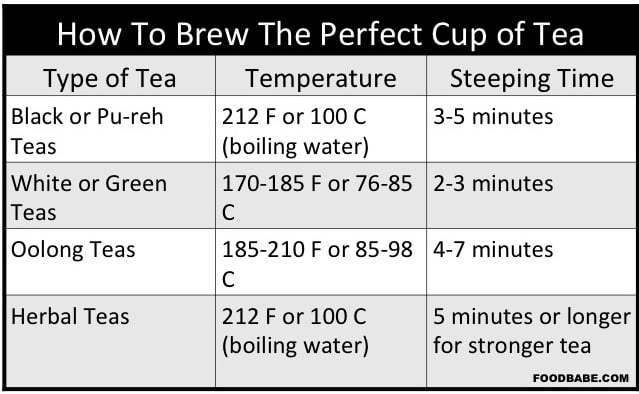

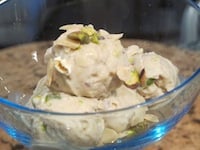

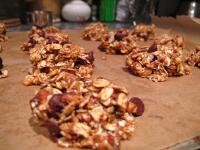


You didn’t mention tulsi tea by organic India ??
Well this wasn’t an exhaustive list of every tea company, seemingly just the more popular ones…
I was just wondering why you chose not to mention buying your own organic leaves from reputable sources to brew your own tea? Funny enough I just started doing that and now that I read your blog it makes even more sense!!!
Yes, I love this brand of tea. Recently when I ordered bulk on amazon, my shipment came straight from India. Their tulsi masala chai is amazing. Love it so much.
People always thank military people for there service. I have made it a point to ALSO thank people like you who work very hard at trying to make this a safer and healthier world. Thank You for your service Max
Hear! Hear! Thank you, Food Babe!
Really pissed about Teavana wonder if they have always been that way or just since they been bought out? Wow cant afford to toss what I have.
What about peets teas? I have had them in the past.
Teavana has always had these ingredients. Sad but true.
Just toss it! You can’t afford not to!
I drink about a gallon of Lipton Ice Tea each day. I’ve been doing it for fifty years. Please tell me the story on Lipton.
Thanks,
Doug
Me too! I drink Lipton Ice Tea all the time. Can you recommend a brand that is organic and easy to find?? I live in Central Florida.
scroll up a little bit to the chart – Lipton is on the list as having toxic pesticides, GMOs, and harmful packaging.
Just fyi, Trader Joe’s states on their website (http://www.traderjoes.com/about/general-faq.asp#PrivateLabel) that:
“When you see our name on a label, you can be assured that the product contains:
√ NO artificial flavors or preservatives
√ NO synthetic colors
√ NO MSG
√ NO genetically modified ingredients
√ NO partially hydrogenated oils (artificial trans-fats)
√ NO “marketing” costs
√ YES tasting panel approval
√ YES quality ingredients
√ YES great price”
would be cool if it were all true. Food Babe dug deep for us a week or so ago.
https://foodbabe.com/2013/08/07/what-is-trader-joes-hiding/
https://foodbabe.com/2013/08/07/what-is-trader-joes-hiding/
As with all pieces attempting to be influential about any company, it’s important to keep things in perspective and present fair and balanced information. One commentor on the TJ’s post summed this idea up quite well (and while it would be fantastic if companies took it upon themselves to do the noble thing and try to save the country from GMOs, it’s just not going to happen in a capitalistic market; it will begin with laws, and until the majority demands them, there will be no change):
“MamaKate on August 20, 2013 at 10:21 pm said:
I wouldn’t write off Trader Joe’s based on this report, which I find brings up some valid concerns but under emphasizes the positives of Trader Joe’s.
Food Babe basically says to watch non-organic and non-TJ’s brand items. Wouldn’t someone who is concerned about what they are eating do that anyway?? Trader Joe’s carries healthy food as well as a lot of candy/junk. I hope no one buying red licorice or sweetened cereals thinks that is a healthy choice!
Trader Joe’s makes it affordable for my family to eat very well. We purchase the majority of our grocery items there – supplementing with a CSA subscription, the farmer’s market, a local butcher and a local fishmonger. We are able feed our family with this combination for less than it would cost to shop at our local Jewel (Albertsons) and WAY less than it would cost to shop at Whole Foods. Our TJ’s store carries local produce (varies by season – more in the summer here in the midwest, of course) and we’ve had good luck with non-local organic produce purchased there. If we ever have a problem with produce (or anything else) they take it back with no questions asked.
Additionally, the employees of the store live in my neighborhood and seem happy to be at work. They’ve gotten to know our family and greet us when we’re out and about – both at the store and in the neighborhood. When my daughter was born, they gave us a bouquet of flowers in congratulations during our first visit into the store as a family of 3. It’s a close to a local grocer as I can find in my big city these days.
I have heard through the grapevine who some of their local suppliers are (friends working at the suppliers) and understand the concerns about confidentiality. From my understanding, in addition to big national brand suppliers (e.g. stonyfield), they use local suppliers – (e.g. local breweries or coffee bean roasters in your city). That seems like a win-win for the local economy and an appropriate reason for confidentiality.
We do need to be concerned about GMO’s. But, for many of us, this is one of many issues. A balanced report acknowledging the positives of Trader Joe’s would be more helpful. I’d hate to think this report would force their hand towards raising prices to get 3rd party certification or only suppliers who can handle the “competition” of lower priced TJ offerings, effectively pricing some of us out of their organic food offerings.”
I usually try to drink Numi, Choice, or Eden Foods. They have the best stuff. Yogi organic varieties are good tooI admit I’ve had pesticide Celestial Seasonings recently… but only the ones without soy… and very rarely. Numi is by far the very best!
” While the processing for PLA removes all traces of genetic material, it is still made with genetically modified corn.”
Hi. Thank you for the article. The comment above about all traces of genetic material not being present is something I am curious about. I am wondering where that information came from? Here in Australia we have been fed the line that there is no trace of protein left in oils and this is the justification for them to not be labelled. However, if one was allergic to peanuts one would still have a reaction to a peanut oil. So yes it is wise to avoid anything sourced (or fed) GMOs.
I am very curious about your information source and hope you will answer my question. Thank you.
Anna
What do you think about restaurants who are trying to be “green” and use corn based disposable utensils and cups? If there is no boiling water, are we to consider it safe? Thoughts? Much appreciated.
Thank-you for a wonderful in-depth report! I am usually very careful and read labels, fine-print, etc. Some of my Yogi teas were grabbed on sale, and I assumed, based on past purchases, that they were ALL fine. It just goes to show that we can’t be too vigilant.
What about Stash teas?
What about a list of teas that are good to drink and support?? It’s easier for people to read what they can and should do instead of what not to consume.
I shared your story on the tea brands and received feedback that you did not mention the only tea plantation that is in the United States, the Charleston Tea Plantation. Do you have any thoughts/comments on it?
I’d be curious to know this too!
Me, too! SC has some safety-conscious people where this kind of thing is concerned, and I would love to think we are producing a non-toxic product over here!
Vani, I’m so glad to see you exposing all these dirty little secrets. I started using loose whole herb teas a few years ago, and could not go back to tea bags – all I could taste was the bag! Even the organic ones seem to have an “extra” taste, so now I know what it was.
Whole organic teas and herbs are the most fragrant, beautiful, beneficial form (aside from fresh). They have great health benefits and can be used as potent medicines. Hmmm, imagine the food industry taking something that is good for us and turning it into something that is bad for us… it’s all about getting these products as pure and close to the source as possible. Then you can blend them yourself!
My favorite blend is a red rooibus with a touch of marjoram and a piece of vanilla bean, I can drink it all day with a little honey or lemon, even a little mint from our patch. It’s super versatile, good hot or cold, and keeps in the fridge for days. It’s also inexpensive – I get a pound of organic rooibus for around $10 online (that lasts me over a month). Most days I just make it in my coffee pot, I use the more natural non bleached filters which I find don’t add any “extra” taste. You could also use a natural muslin bag. Loose teas and herbs are super easy to work with, and so much less expensive (not to mention higher quality) than their sad, bagged counterparts.
What about Organic India teas?
Vanni,
Your part of my healthy living. I dont have time to research everything and I have food allergies which started me to eat healthy so I look at it as a blessing. I have a question have you heard of Zhi Tea. Its online and they were started in austin, tx. Great shop. He prides him self on sustainable tea, no chemicals, etc but we do see natural flavors on the label and its some thing we are going to ask since I have food allergies but what would you say. Its loose leaf. Tin cans everything you talk about in good tea.
Thanks,
Connie
Glad I drink Stash!
Me too!
Austria is super blessed when it comes to tea and spices thanks for this company called Sonnentor (sun door). It was started by an organic farmer in Lower Austria about an hour and a half away from Vienna. You can actually go there and visit the farmers who grow the herbs there. All batches get tested twice from independent labs to make sure they are pesticide free. The packaging is 95% organic and biodegradable. They produce it there in there little factory. Sonnentor is passionate about real food and maintaining nature. I adore this company! The products are superior too. You can really taste the difference organic and all natural makes! I don’t know if they sell in the US too but this is their website: http://www.sonnentor.com. I would be happy to send you some great tea when I am in Cali in September Vani. 🙂
Yikes! All this time I thought I was a careful and smart shopper. I will no doubt have to be more diligent in my purchases. Thanks a million.
I have a question (b/c I love yogi tea as well)…since it’s the tea bag that’s the problem, could you just cut the tea out of the bag and brew it loose-leaf or in a tea ball? or just the fact that the tea has been sitting in the bag already causing a problem? Thanks!
FB doesn’t say that the tea bag is the problem with Yogi teas. She says she didn’t know the packaging process at the time of posting, and that only the non-organic line contains residual pesticides. Yogi has since explained that their tea bags are safe, so the organic varieties of Yogi tea should be up to snuff.
How about PG tips? Anyone know??? A British brand!
I have used Good Earth original tea for years, but NO more. It’s not on your list, but it has been changed somehow & tastes more like chemicals than tea. I just purchased some Harney & Sons loose tea. It’s the real thing… delicious!
Thanks Vani! I thought I was safe buying organic teas in order to avoid pesticides in my prodcut, as well as to vote with my dollars, but who would have thought I’d have to worry about the packaging too! Is it safer to cut open a tea bag and put it in a stainless steal caddie?
Love my Traditional Medicinals, although admittedly I am using it for detox more than taste (EveryDay Detox Lemon to keep my liver happy). Also love loose hibiscus tea from Fairway Market (NYC area). I’ll stick with organic for others so at least I know there’s no pesticides.
I love tea and was so disheartened to read this article!! Like someone mentioned above, can you give us a list of teas that are better? I use Danedar tea from India…I am afraid to see what’s inside that. …would know anything about this tea? Thanks so much for all your hard work!!
I just noticed your two stacks of yogi tea in your drawer, a little surprised you haven’t toss them by now during your research. I have the ginger peach and its already in the trash.
The organic varieties of Yogi tea are fine. FB only mentions the potential dangers of their non-organic line.
Thanks for your investigation! I drink a cup of green tea every morning. I’ve been using Bigelow USDA organic green tea. The only ingredient listed is organic green tea. But I noticed that Bigelow is one of the “bad” brands you mentioned. Should I be concerned?
I really enjoy Tulsi Tea by Organic India and their green tea! I buy them from Amazon.
Thank you for your report Food Babe. Scary stuff. Can you take your tea out of the bag and put it in a loose leaf stainless steel container to be on the safe side? I notice that my Stash tea has or may contain “soy”. I drink Yogi and Stash. I have always detested Celestial Seasonings.
Goodness! Thank you for investigating this! I can’t believe one of my favorite things, I believed to be good, especially since drinking Celestial Seasonings since childhood. It’s crazy. I *know* companies put crap ingredients in their food, yet I didn’t think twice about my tea. Thanks for exposing it and giving some healthy recommendations. 🙂
I contacted Trader Joe’s a few months ago and they guarantee that all of their name brand products are GMO free. Their email is below…
Dear Melissa,
Thank you so much for contacting us, and thank you for your important questions. The short answer to this inquiry is, yes, we do verify that every ingredient used in our products is non-GMO. While considered classified documentation and not available to the public, this verification comes in the form of seed stock verification, signed affidavits, and -frequently- 3rd party lab analysis.
We hope this helps a bit, and please know that we are 100% committed to our non-GMO ingredients claim!
Best regards,
Rachel
Customer Relations
Trader Joe’s
Hi Melissa,
Dont believe everything you read from a bajillion dollar company with its own marketing/PR staff. Food Babe unearthed some alarming stuff.
https://foodbabe.com/2013/08/07/what-is-trader-joes-hiding/
We brew our tea in a cast iron tea pot we got from Teavana and we unfortunately also use Tevana tea!
What do you think of a cast iron tea pot? Thank you for all your work!
I am a Steeped Tea rep in Canada, when it comes to the “natural flavoring” in teas, alot of the time the purpose of that listing is because the tea company hasn’t made that part of the tea and does not know the exact ingredients. Most tea companies buy from a wholesaler who receives their tea from the growers. They in turn make the tea into various types before selling it to a smaller company. We don’t buy black tea and make it earl grey, we buy earl grey and go from there, making de la creme and russian flavors. The “natural flavoring” is what that wholesaler used to make it earl grey. Our earl greys are described as having hints of bergamot but there is no bergamot listed under the ingredients because it is a natural flavoring added before we get it. Obviously this isn’t a great practice for business now a days when people have many food allergies and really investigate their food. There should be more transparency, I just wanted to state that “natural flavoring” is not necessarily as bad this article would lead us to believe.
It must be 10 or 15 years since I’ve used a tea bag! Loose whole-leaf organic in a gold strainer for me; try it, you’ll never look back. LOTS cheaper, too!!
Do you know that many teas also contain animal (usually cow) blood, to create that rich red colour? Even if you are not vegetarian, who would want to drink blood?! Many teas have started to label themselves vegetarian, so you can buy those ones, or email the company to ask if your favourite has blood in it – it’s not something they generally include on their FAQ page! Just another one of those “natural ingredients.”
I find this article very interesting and it makes sense. I stopped drinking tea, because over a year ago I noticed it was giving me headaches. I am extremely sensitive to any preservatives or chemicals. I was only drinking herbal and organic teas and I didn’t understand why I had trouble with them – it makes sense it would be the packaging. I’ve also tried loose tea and I still get headaches – not sure what that was about. Now I drink homemade ginger tea – without a doubt I know what’s in it. Thanks for your great work and enlightenment!
I cut the tea because of histamine problems (benzoates). Tea is also allowed to have a certain level of fecal matter in it (apparently comes from rat droppings in the factory).
I ordered Budha tea which mentions there tea bags are not bleached – as bleached tea bags contain dioxin – a cancerous chemical –
Did you research Dioxin and tea bag bleaching?
Thanks!
What about Alvita? And Celebration Herbals? On their boxes it doesn’t say any ingredients..
What about Alvita and Celebration Herbals? Doesn’t say any ingredients on their package —
Have you ever heard of Organo Gold? They have an Organic Green Tea that is infused with Ganoderma. The only two ingredients in it are Organic Green Tea and Organic Ganoderma Lucidum. I will send you a sample if you would like to try it. My customers can not get over how good it tastes.
I did a little searching of my own about Teavana. Did you know they had been acquired by Starbuck’s? http://www.jsonline.com/blogs/news/191252151.html
I’ve purchased adagio tea before and now I’m trying to find out how they measure up. Inquiring minds WILL find out!
Yes! I knew… Thanks for sharing!
The labeling of products as “organic” does not mean that they are pesticide free, nor does it means that the pesticides used aren’t toxic. Many non-organic (synthetic) pesticides are far safer for human consumption than so called “organic” pesticides. The rules and regulations that dictate organic farming and labeling do not guarantee that any item that you consume will be free from toxins. Be a wary consumer and know that there is no avoiding pesticides unless you want to grow your own tea leaves.
I admire the research you do, thank you. I don’t see this information anywhere else. All I know is that my trusted health food stores sell the Celestial Seasons brand, so I thought it was alright. I think I’ll stick to brewing fresh herbs from the garden from now on.
Any idea where “Mighty Leaf” tea fits into this research? I’m curious if this one would make it on your thumbs up or down list. Thanks!
Thank you food babe! It just so happens that my favorite, purest tasting tea I’ve ever bought was a Numi and in the past I bought the hype and unfortunately the celestial herbal sleepytime tea and it made me feel queasy and ill every time I drank it, now it makes since! As far as teavana, they have totally explioted the goal of good health, ripping people off and smiling as they do so, I went to that store once, they didn’t even have what I was looking for (dandilion tea) and tried to hard sell me on $60 worth of over priced junk! I walked out empty handed and never looked back! Btw, never was impressed with trendy tazo either. Ifyou want to spend more, may as well go for quality organic- not trendy names 😉
I would love to know where you got your tea organizer?
Here’s the link – she got it at the container store. http://www.containerstore.com/shop/closet/drawerOrganizers?productId=10026838&N=69446
Thank you!
What about the Yogi Green Tea??? It is organic but is the problem with the tea bag itself???
Thank you so much for your hard work and dedication. I am dismayed at what you have discovered. I drink Twinings Earl Grey a few times a day. I used to drink Teavana and was thinking of purchasing again, but after your report, I will not buy. I also want to thank you for your eye report a few weeks ago. I purchased one of the mascaras you recommended and am happy with it. Thanks again for all you do.
Looks like Stash tea is alright! 🙂
I make a gallon of iced tea every day from lemons, organic Fair Trade sugar, and a brand called Lifeboat from Kenya that gives profits to the safety patrol along the coasts of the UK. I hope it’s OK because we drink a lot of it! It is sold at World Market.
When the Revolution in China came to Tibet and made the wretched poor the priority, the first thing they brought everyone was cheap tea, which had been unaffordable. Almost immediately the dysentery and other common ailments slacked off. Even cheap tea is good…the water must be boiled and it has anti-oxidents.
A missionary friend told me to NEVER make sun tea because all tea is full of dust and germs and should only be made with water at a boil.
One more thing…plastic lemon or lime juice has sulfites to keep the color. I am allergic and so are many others…some people get headaches, gas. I get asthma attack instantly. Don’t serve guests or strangers anything with this crap…how much trouble is it to squeeze a lemon?!!
Thanks for this…Celestial Seasonings used to get wild crafted herbs from Appalachia…gone are the days. So many brands are only empty shells…Levis are made by slaves, US Keds by Chinese teenage girls…on and on. Shop wisely and with compassion.
Yogi produces 2 types of tea, the USDA organic and the non-organic. I drink the USDA organic Yogi tea.
The chart you posted startled me since I am a daily Yogi tea consumer. Do both (organic and non-organic) Yogi tea’s contain toxic pesticides? Please let me know!
Thank you for your hard work and dedication!
FROM YOGI TEA!!! ON THERE FB PAGE, in response to this article!!!!
Thank you for your thoughtful comment, and for bringing this blog post to our attention. We were disappointed to read it and can confirm that it contains explicitly inaccurate and misleading information about Yogi teas.
Here at Yogi, we source the highest quality herbs and botanicals from around the globe, and none of our teas contain any artificial ingredients. We follow the National Organics Program (NOP) for all of our ingredients. We are extremely selective and work only with vendors who can document that they meet the NOP requirements for each ingredient we purchase from them. According to the standards set forth by the NOP, we do not accept any conventional raw ingredients contaminated by GMOs, pesticides, sewer sludge, ionizing radiation, or artificial ingredients.
With regard to our tea bag filtration paper, we currently use a non-heat sealable paper made from a select blend of high quality manila hemp (abaca) fibers and wood pulp. The filtration paper does not contain epichlorohydrin or plastic. It is oxygen bleached using a natural process that is completely free of chemicals or toxins. In addition, our tea bag filtration paper does not contain gluten, GMOs, corn nor any of the eight FDA recognized allergens (tree nuts, peanuts, milk, eggs, fish, crustacean shellfish, wheat or soybeans).
We hope that this information adequately addresses your questions and concerns.
Be Well!
Thank you for your response, I really appreciate it!
I have been curious for some time now about whether or not there is a difference between the Yogi tea non-organic and organic ingredients. Does the quality differ?
Stating that this blog posting contains “explicitly inaccurate and misleading information about Yogi teas”, is, ironically, an inaccurate and misleading statement.
This is a general posting about tea options. The only reference to Yogi is in the 5th figure in the posting, in which a check mark appears in the box indicating that Yogi’s conventional line (i.e., non-organic) contains pesticides. A question mark in the packaging box indicates that Yogi’s packaging methods are unknown.
Yogi tea is not the primary focus of this posting (Celestial Seasonings and Teavana are). Yogi tea is mentioned simply because it is one of the more popular, widely-consumed brands. In fact, analysis of the brand comparison table paints Yogi as one of the better brands.
I encourage the Yogi Facebook people to re-read the posting, paying close attention to Food Babe’s exact words, rather than putting a presumptuous lexicon in her mouth. If anything, Yogi tea should be thanking Food Babe for the positive (and free!) advertising.